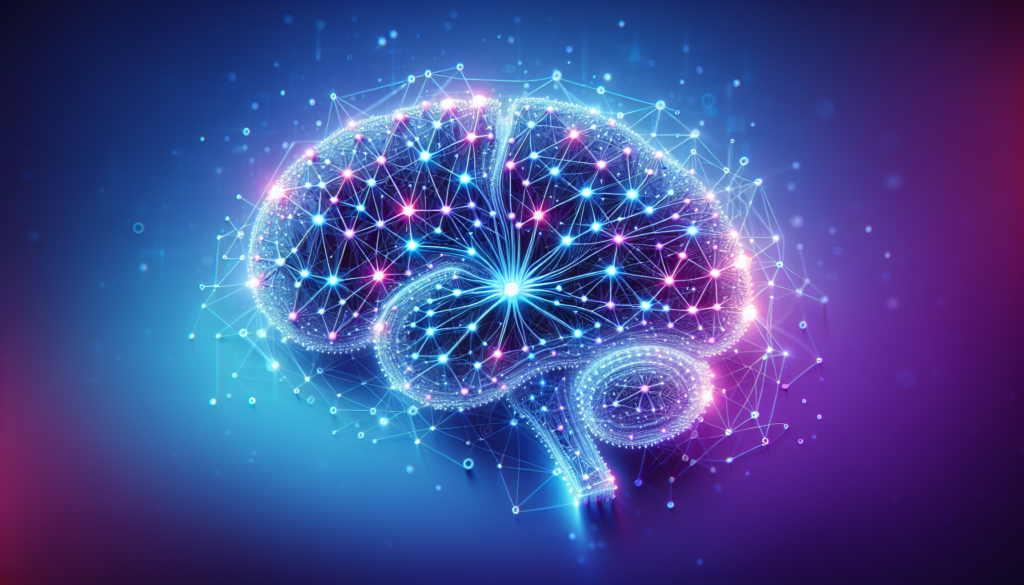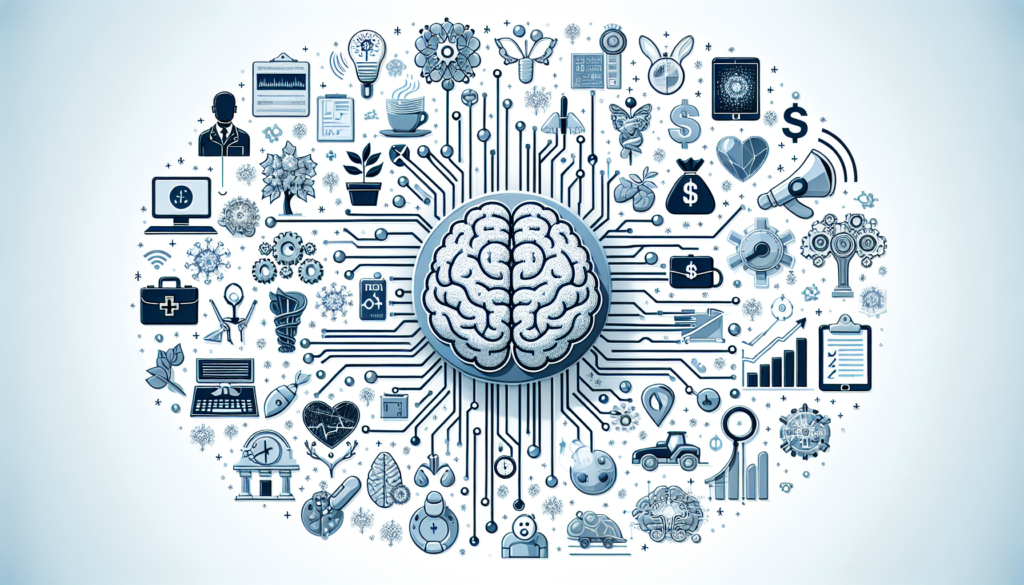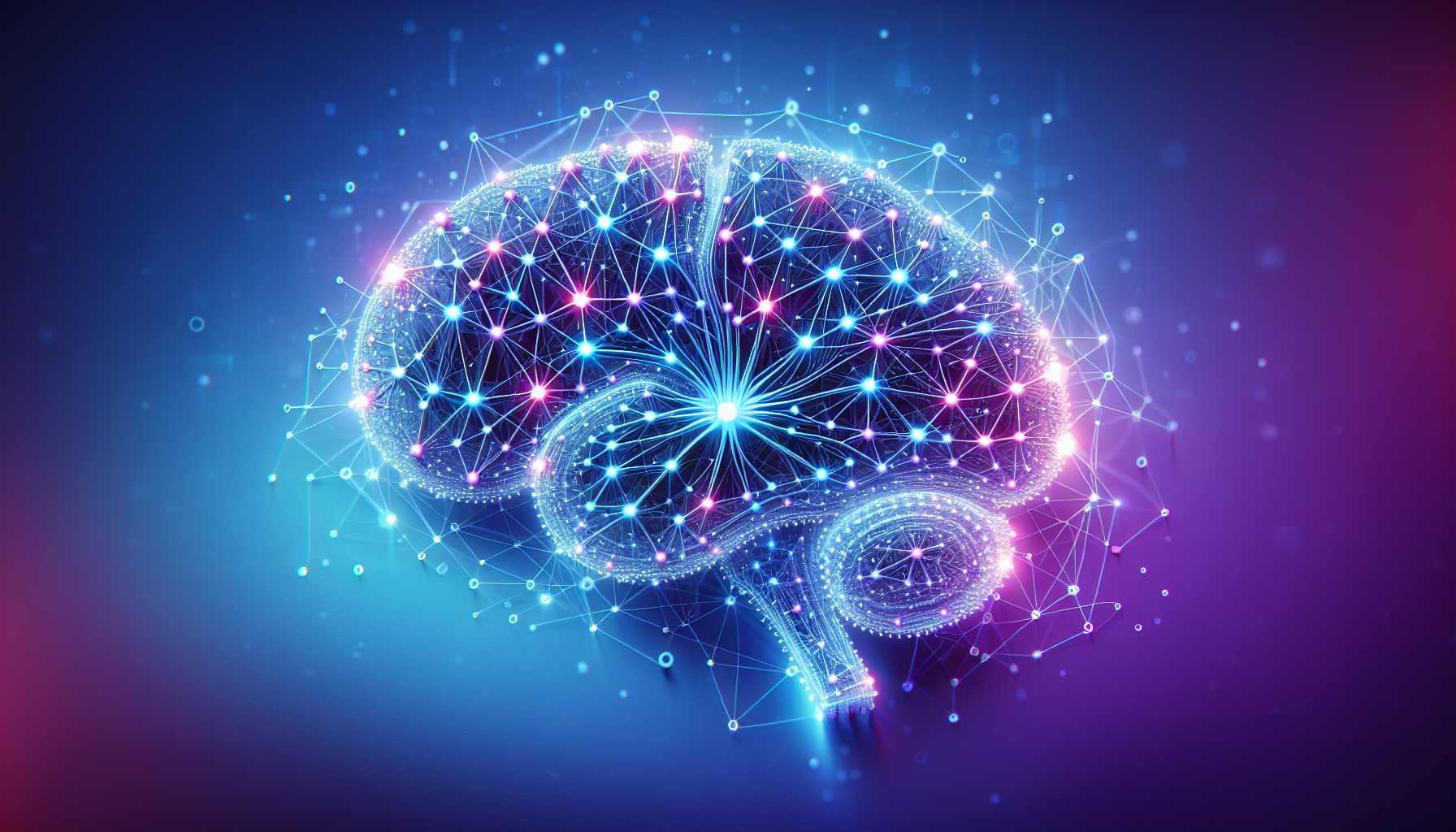Imagine a world where software can predict your next move, analyze huge amounts of data in seconds, and even create new art or music. Artificial Intelligence (AI) is not just a concept anymore; it’s starting to be integrated into our everyday lives. From personalized recommendations on streaming platforms to self-driving cars, AI is revolutionizing various industries. In this article, we will explore three fascinating examples of AI in action that will leave you amazed at the possibilities of this cutting-edge technology.

Healthcare
AI in medical diagnosis
AI has revolutionized the field of medical diagnosis by providing faster and more accurate results. Through machine learning algorithms, AI systems can analyze vast amounts of medical data, such as patient records, lab results, and imaging scans, to identify patterns and make accurate diagnoses. This not only saves time for healthcare professionals but also enhances the accuracy of diagnoses, leading to improved patient outcomes. Additionally, AI can assist in early detection of diseases by spotting subtle abnormalities in medical images that may be missed by human eyes. This technology has the potential to greatly improve the efficiency and effectiveness of medical diagnosis.
AI in drug discovery
The process of discovering and developing new drugs is time-consuming, expensive, and often involves significant trial and error. However, AI is transforming this process by speeding up drug discovery and reducing costs. AI algorithms can analyze vast databases of drug compounds, genetic data, and scientific literature to identify potential candidates for drug development. By simulating and predicting the behavior of these compounds, AI systems can identify promising drug candidates much more efficiently than traditional methods. This not only accelerates the development of new treatments but also enables the exploration of potential drug combinations and personalized medicine.
AI in robotic surgery
Robotic surgery is another area where AI is making significant advancements. AI-powered robots can assist surgeons during complex procedures to enhance precision, reduce human errors, and improve patient safety. With the help of AI algorithms, robots can analyze real-time data from medical sensors and imaging devices to provide surgeons with valuable insights and guidance. This allows for more precise incisions, better tissue handling, and improved overall surgical outcomes. AI in robotic surgery has the potential to revolutionize surgical procedures by combining the expertise of surgeons with the precision and capabilities of machines.
Transportation
AI in autonomous vehicles
Autonomous vehicles are rapidly becoming a reality, thanks to advancements in AI technology. AI algorithms enable cars and other vehicles to perceive and interpret their surroundings, making independent decisions to navigate and operate safely on the road. With the ability to analyze sensor data from cameras, radars, and LIDAR systems, AI-powered autonomous vehicles can detect obstacles, pedestrians, and other vehicles, allowing for safer and more efficient transportation. This technology has the potential to greatly reduce accidents and traffic congestion, as well as provide increased mobility for people who are unable to drive.
AI in traffic management
Traffic management is another domain where AI is playing a crucial role. AI systems can analyze vast amounts of traffic data, including real-time information from cameras, sensors, and GPS devices, to optimize traffic flow and reduce congestion. By predicting traffic patterns, AI algorithms can dynamically adjust signal timings, control traffic lights, and suggest alternative routes to alleviate congestion and improve overall transportation efficiency. AI in traffic management has the potential to transform urban mobility, making travel faster, more predictable, and environmentally friendly.
AI in predictive maintenance
AI is also revolutionizing the field of predictive maintenance in transportation. By analyzing data from sensors embedded in vehicles, AI algorithms can detect early signs of potential failures or malfunctions, allowing for proactive maintenance and repair. This not only helps prevent costly breakdowns but also increases the lifespan of vehicles and reduces maintenance costs. With AI-powered predictive maintenance, transportation companies can optimize their maintenance schedules, reduce downtime, and ensure the reliability and safety of their vehicles.
Finance
AI in fraud detection
Fraud detection is a critical concern for the financial industry, and AI is proving to be a powerful tool in combating fraudulent activities. AI systems can analyze vast amounts of financial data, including transaction records, customer behavior patterns, and external data sources, to identify anomalies and patterns indicative of fraudulent activities. By continuously learning and adapting, AI algorithms can detect emerging fraud trends and develop more effective fraud prevention strategies. AI in fraud detection not only helps financial institutions protect themselves and their customers from financial crimes but also improves overall trust in the financial system.
AI in algorithmic trading
Algorithmic trading is a prevalent practice in the financial industry, and AI is playing an increasingly significant role in this field. AI algorithms can analyze vast amounts of financial data, including market conditions, historical prices, and news events, to identify patterns and make rapid trading decisions without human intervention. AI-powered trading systems can execute trades at high speeds, leverage sophisticated mathematical models, and adapt to changing market conditions, leading to increased profits and reduced risks. AI in algorithmic trading is transforming the financial markets by bringing efficiency, speed, and accuracy to trading operations.
AI in customer service
Customer service in the finance industry has greatly benefitted from AI technology. AI-powered customer service solutions, such as chatbots and virtual assistants, can interact with customers in real-time, providing instant responses to queries, assisting with account management, and guiding users through various financial processes. Through natural language processing and machine learning, these AI systems can understand and interpret customer inquiries, giving accurate and personalized responses. This not only improves customer satisfaction but also reduces the workload on human customer service agents, allowing them to focus on more complex and specialized tasks.
Education
AI in personalized learning
Personalized learning is an approach that tailors educational content and methodologies to the specific needs and preferences of individual students. AI technology is enabling personalized learning at scale by analyzing student data, such as performance records, learning styles, and preferences, to create adaptive educational experiences. AI-powered platforms can provide personalized recommendations, customized learning paths, and real-time feedback, helping students optimize their learning and improve their academic outcomes. AI in personalized learning has the potential to revolutionize education by providing tailored support and guidance to each student, regardless of their learning pace or ability.
AI in virtual tutors
Virtual tutors powered by AI are transforming the way students receive personalized educational support. These AI systems can interact with students through natural language processing and provide real-time explanations, guidance, and feedback. With the ability to analyze student responses and behaviors, virtual tutors can identify areas of difficulty, adapt instructional approaches, and offer tailored support. AI-powered virtual tutors enable students to receive personalized assistance outside the traditional classroom setting, allowing for more flexible and individualized learning experiences. This technology has the potential to bridge the gaps in education and provide equitable access to quality education for all.
AI in automated grading
Grading and assessing student assignments is a time-consuming task for educators, but AI is streamlining this process through automated grading systems. AI algorithms can analyze and evaluate student responses, essays, and assessments, providing instant and consistent feedback. With the ability to recognize patterns and assess complex criteria, AI-powered grading systems can save educators valuable time, reduce bias, and ensure fair and objective evaluations. AI in automated grading not only benefits educators by freeing up their time for more meaningful interactions with students but also provides students with timely feedback and opportunities for improvement.

Marketing
AI in recommendation systems
Recommendation systems powered by AI have become an integral part of modern marketing strategies. By analyzing vast amounts of customer data, AI algorithms can personalize product recommendations based on individual preferences, purchase history, browsing behavior, and demographic information. These recommendation systems can optimize sales conversion rates, increase customer engagement, and enhance the overall shopping experience. AI-powered recommendation systems enable businesses to deliver targeted and relevant recommendations to their customers, improving customer satisfaction and driving revenue growth.
AI in chatbots
Chatbots have become increasingly prevalent in customer service and marketing, thanks to AI technology. AI-powered chatbots can interact with customers in real-time, answering their queries, providing product information, and guiding them through the purchasing process. Through natural language processing and machine learning, chatbots can understand and interpret customer inquiries, offering accurate and personalized responses. This not only improves customer satisfaction but also enables businesses to handle a high volume of customer inquiries efficiently. AI in chatbots is revolutionizing customer interactions, providing instant and personalized assistance 24/7.
AI in sentiment analysis
Sentiment analysis is a valuable tool in marketing, enabling businesses to analyze customer feedback, social media posts, and online reviews to understand consumer sentiments and opinions. Through AI-powered sentiment analysis, businesses can gain insights into customer perceptions of their products, brands, and marketing campaigns. AI algorithms can categorize and analyze large volumes of text data, identifying positive, negative, and neutral sentiments. This allows businesses to make data-driven decisions, refine marketing strategies, and address customer concerns promptly. AI in sentiment analysis enhances customer understanding and helps businesses stay responsive to evolving customer preferences.
Manufacturing
AI in quality control
Quality control in manufacturing processes is vital to ensure that products meet the required standards. AI has proven to be a valuable tool in automating and enhancing quality control procedures. AI algorithms can analyze real-time data from sensors and imaging systems to identify defects, anomalies, or variations in product quality. By detecting and addressing issues early in the manufacturing process, AI-powered quality control systems can reduce waste, improve product consistency, and optimize overall efficiency. This technology enables manufacturers to deliver high-quality products while minimizing costs and improving customer satisfaction.
AI in predictive maintenance
Predictive maintenance in manufacturing involves using AI algorithms and machine learning to monitor equipment and machinery conditions, predicting when maintenance or repairs are needed. By analyzing real-time sensor data, AI systems can identify patterns that indicate impending failures or malfunctions. This allows manufacturers to schedule maintenance proactively, minimizing downtime, preventing costly breakdowns, and optimizing maintenance resources. Implementation of AI in predictive maintenance offers manufacturers the ability to maximize equipment availability, reduce maintenance costs, and improve overall operational efficiency.
AI in supply chain optimization
Supply chain optimization is a complex task that involves managing inventory, production, logistics, and distribution. AI has emerged as a powerful tool for optimizing and improving all aspects of the supply chain. AI algorithms can analyze vast amounts of data, including demand forecasts, historical sales, and market trends, to optimize inventory levels, reduce stock-outs, and minimize inefficiencies. By leveraging AI technology, manufacturers can streamline their supply chain operations, reduce costs, and improve customer satisfaction by ensuring the availability of products when and where they are needed.
Customer Service
AI-powered chatbots
AI-powered chatbots are transforming customer service by providing instant and personalized assistance to customers. Chatbots can interact with customers in real-time, answering their queries, helping with account management, and guiding them through various processes. Through natural language processing and machine learning, chatbots can understand and interpret customer inquiries, providing accurate and timely responses. This not only improves customer satisfaction but also allows businesses to handle a high volume of customer inquiries efficiently, reducing wait times and improving overall service quality. AI-powered chatbots are revolutionizing customer service by offering 24/7 support and personalized engagement.
AI in voice recognition
Voice recognition technology powered by AI has greatly advanced customer service capabilities. AI algorithms can analyze and interpret spoken language, enabling voice-based interactions with customer service systems. With the ability to recognize and understand natural language, AI-powered voice recognition systems can provide customers with accurate and efficient support over the phone or through voice-enabled devices. This technology eliminates the need for customers to navigate complex menus or wait for human assistance, improving overall service accessibility and convenience.
AI in sentiment analysis
Sentiment analysis, powered by AI, has become an essential tool for understanding customer perceptions and opinions. AI algorithms can analyze customer feedback, social media posts, and online reviews to identify positive, negative, and neutral sentiments. This allows businesses to gain insights into customer sentiments towards their products, brands, or services. By monitoring and analyzing customer sentiment, businesses can promptly address concerns, improve customer satisfaction, and refine their customer service strategies. AI in sentiment analysis enables businesses to stay responsive and proactive in meeting customer expectations and enhancing their overall experience.
Entertainment
AI in content creation
AI technology is transforming content creation in the entertainment industry. AI algorithms can analyze vast amounts of data, such as images, videos, and text, to generate new and personalized content. From generating automated news articles to creating realistic computer-generated imagery, AI-powered content creation systems enhance creativity, efficiency, and productivity in the entertainment industry. AI-generated content can be customized to meet individual preferences, providing personalized entertainment experiences for users.
AI in recommendation systems
AI-powered recommendation systems have become an essential part of the entertainment industry, helping users discover new content based on their preferences and behaviors. By analyzing user data, such as viewing history, ratings, and demographic information, AI algorithms can provide personalized recommendations for movies, TV shows, music, and more. This enhances user engagement, improves content discovery, and increases viewer satisfaction. AI in recommendation systems offers users a curated and personalized entertainment experience, enabling them to explore a vast array of content suited to their preferences.
AI in gaming
AI technology is also shaping the gaming industry, enhancing gameplay experiences and enabling more realistic virtual worlds. AI algorithms can be used to create intelligent NPCs (non-player characters) that exhibit human-like behaviors and respond dynamically to player actions. This creates a more immersive and challenging gaming experience for players. Additionally, AI can analyze player data to adapt game difficulty, provide personalized hints or rewards, and create customized gaming experiences. AI in gaming opens up new possibilities for interactive and engaging gameplay, captivating players and pushing the boundaries of virtual entertainment.
Security
AI in video surveillance
Video surveillance systems have greatly benefited from AI technology. AI algorithms can analyze live or recorded video footage to detect and identify objects, people, and actions of interest. By using techniques such as object recognition and behavior analysis, AI-powered video surveillance systems can automatically identify suspicious activities, alert security personnel, and prevent potential security threats. AI in video surveillance enhances the effectiveness and efficiency of security measures, providing increased safety and protection in various environments.
AI in cybersecurity
AI plays a crucial role in strengthening cybersecurity defenses against evolving threats. AI algorithms can analyze vast amounts of data, detect patterns, and identify potential security anomalies or attacks. AI-powered cybersecurity systems can monitor network traffic, identify malware, and prevent unauthorized access in real-time. In addition, AI can continuously learn from new threats and adapt its defenses, providing proactive protection against emerging cyber threats. AI in cybersecurity is vital in safeguarding sensitive data, protecting critical infrastructure, and maintaining the integrity of digital systems.
AI in biometric authentication
Biometric authentication, such as fingerprint or facial recognition, has become a widely used security measure, and AI is instrumental in its implementation. AI-powered biometric systems can analyze and match unique biometric features against stored templates to verify individual identities accurately. By leveraging AI algorithms, biometric authentication systems can continuously improve accuracy, adapt to variations in the biometric data, and prevent circumvention attempts. AI in biometric authentication enhances security by providing reliable and efficient identity verification, reducing the risks of identity theft and unauthorized access.
Retail
AI in demand forecasting
Demand forecasting is a critical aspect of retail operations, and AI technology offers valuable capabilities in this area. AI algorithms can analyze historical sales data, market trends, weather patterns, and other relevant factors to predict future demand accurately. Accurate demand forecasting enables retailers to optimize inventory levels, reduce stockouts and overstocking, and improve overall supply chain efficiency. With AI-powered demand forecasting, retailers can enhance their planning and stocking strategies, leading to improved customer satisfaction and increased profitability.
AI in inventory management
Inventory management is a complex task for retailers, but AI technology provides solutions to optimize this process. AI algorithms can analyze various factors, including sales data, supplier information, product life cycles, and seasonality, to optimize inventory levels and reduce carrying costs. With real-time monitoring and predictive analytics, AI-powered inventory management systems can identify upcoming trends, anticipate demand fluctuations, and automate replenishment processes. AI in inventory management enables retailers to minimize stockouts, reduce wasted inventory, and increase operational efficiency.
AI in personalized shopping experiences
Personalization is a key driver of customer engagement and loyalty in the retail industry, and AI plays a central role in delivering personalized shopping experiences. AI algorithms can analyze vast amounts of customer data, such as purchase history, browsing behavior, and demographic information, to create personalized product recommendations, targeted promotions, and customized shopping experiences. By understanding individual preferences and preferences, AI-powered personalization systems enhance customer engagement, increase sales conversion rates, and foster long-term customer loyalty. AI in personalized shopping experiences offers customers tailored and memorable interactions, improving their overall satisfaction and driving business growth.
In conclusion, artificial intelligence (AI) is transforming various industries and revolutionizing how we approach critical tasks and operations. From healthcare and transportation to finance, education, marketing, manufacturing, customer service, entertainment, security, and retail, AI is improving efficiency, accuracy, and personalized experiences across the board. With continued advancements in AI technology, we can expect even greater integration and reliance on AI systems in the future, leading to significant advancements in various sectors while enhancing our overall quality of life.
